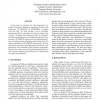Free Online Productivity Tools
i2Speak
i2Symbol
i2OCR
iTex2Img
iWeb2Print
iWeb2Shot
i2Type
iPdf2Split
iPdf2Merge
i2Bopomofo
i2Arabic
i2Style
i2Image
i2PDF
iLatex2Rtf
Sci2ools
101
click to vote
IAT
2008
IEEE
2008
IEEE
Negotiation in Semi-cooperative Agreement Problems
In this paper we introduce the Semi-Cooperative Extended Incremental Multiagent Agreement Problem with Preferences (SC-EIMAPP). In SC-EIMAPPs, variables arise over time. For each variable, a set of distributed agents gain utility for agreeing on an option to assign to the variable. We define semi-cooperative utility as an agent’s privately owned preferences, discounted as negotiation time increases. SC-EIMAPPs reflect real world agreement problems, including meeting scheduling and task allocation. We analyze negotiation in SC-EIMAPPs theoretically. We note that agents necessarily reveal information about their own preferences and constraints as they negotiate agreements. We show how agents can use this limited and noisy information to learn to negotiate more effectively. We demonstrate our results experimentally.
Agents Gain Utility | Agreement Problems | IAT 2008 | Incremental Multiagent Agreement | Intelligent Agent |
Related Content
| Added | 29 May 2010 |
| Updated | 29 May 2010 |
| Type | Conference |
| Year | 2008 |
| Where | IAT |
| Authors | Elisabeth Crawford, Manuela M. Veloso |
Comments (0)

